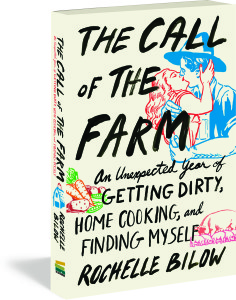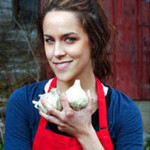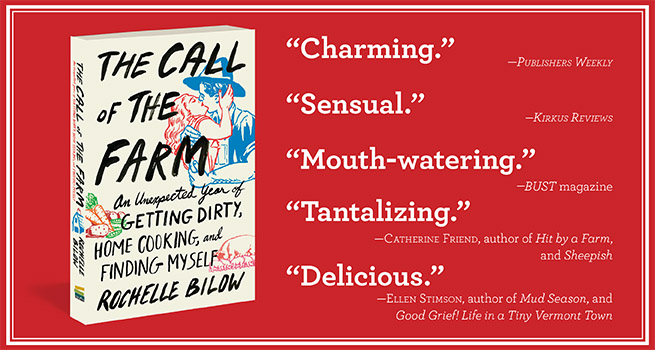With Valentine’s Day marked on the calendar, love is in the air. We sat down with The Call of the Farm author Rochelle Bilow to discuss her own story about falling in love with farm life…and a farmer. She even gives us a special glimpse into modern love with an original piece!
Q: Your book is called The Call of the Farm. What does that represent? Is this just your personal desire to work on the farm, or do you think the idea of farm living is something that appeals to a wide group of people today?
Rochelle: Whenever I talk about my experience at Stonehill, I always find myself saying that before I knew it, I had completely immersed myself in farm life. The raw authenticity and honest quality of the work and culture were so immediately intoxicating to me—and I don’t think I’m alone in that. The majority of us (and I certainly include myself here) are slaves to our devices. Our faces are glued to our screens and our butts stuck to our chairs. And that all feels bad. So it’s no surprise that, when given the opportunity to move, stretch, work outside, and just exist a little closer to nature, we jump on it.
 Q: The farm you worked on in upstate New York is “full diet” which you mention is pretty unique for modern agriculture. Can you speak to that a bit more?
Q: The farm you worked on in upstate New York is “full diet” which you mention is pretty unique for modern agriculture. Can you speak to that a bit more?
Rochelle: It’s funny that “full diet” isn’t a common occurrence in modern agriculture anymore because it’s how most farms were structured before specialization became so prevalent. The farmers at Stonehill aimed to produce the majority of food necessary for a balanced diet: in our case, it was meat, milk, eggs, vegetables, and fruit. We also sold organic grains like oats and wheat, and dried beans, from a farmer down the road. I think that farmers who are embracing this style are attracted to it because it’s mentally and physically challenging work; you really have to be good at a hell of a lot of things to be a proficient full-diet farmer. If you’re of a certain type of personality that sort of challenge is too juicy to pass up. At least that’s what drew me in; I’m a glutton for punishment, and really relished the act of putting myself in new and challenging situations (although careful readers of the book will note I didn’t always appreciate the experience as it happened in real time). Plus, when you grow and raise all of that food, you get to eat it!
Q: In your book’s introduction, after a very theatrical incident involving granola, you mention that you are “completely, unapologetically obsessed with food”. How did your love of eating blossom into a love of cooking?
Rochelle: My love of eating took a brief detour before it really fully developed. Throughout my adolescence, I battled with eating disorders that made it very difficult to embrace food as something both nurturing and fun. Once I recovered—physically speaking, that is—I realized that the missing element of my story was a real and genuine love of food. That’s when the magic really happened: I began to teach myself how to cook before enrolling in culinary school, working in restaurants, and becoming a food writer. I wanted to take something that was challenging and constricting to me, and turn it on its head. Now, I never stop talking about my obsession with food—thankfully, I’m paid to do so!
Q: How did your cooking style change during your time on the farm—and has that carried over into life in the city?
Rochelle: Once I really got into the groove of farm cooking, I stopped relying on recipes. Instead, I let seasonality—real, actual seasonality; not selective choosing of produce when it’s convenient—guide my decisions about what and how to cook. I also really embraced animal fat in a way that surprised me (a former vegetarian). That’s perhaps the most prominent defining factor in my cooking style now—the use of lard, bacon grease, duck fat, etc., in all of my meals. I did try to render my own lard in my apartment once, but my neighbors complained about the smell (which I think is a very nice scent, for the record). Now I buy my lard, etc. from farmers at the greenmarkets and through my CSA, although I usually have a pound of slab bacon in my fridge just for the sole purpose of rendering out fat and using it for cooking. Why use a bland oil when you can cook with a flavorful, good-for-you fat?
Q: You’ve achieved your dream of becoming a food writer for Bon Appetit—how is your writing influenced by your experiences on the farm? In the book the recipes are divided by the season—is your approach to writing for Bon Appetit still influenced by that cycle?
Rochelle: Whenever possible, I push the whole “local, seasonal” agenda for Bon Appétit! My “beat” for Bon Appétit leans less toward restaurants and dining out, and more toward all things cooking, so there is plenty of room for me to talk about seasonality and choosing responsibly-grown and raised ingredients. As my editors can probably tell you, it’s something I try to address whenever possible.
Q: Of the recipes in the book which one is your favorite, and why?
Rochelle: That’s such a tough call! I would have to go with the Brown Butter Butternut Tart. I’m not one to make recipes again and again (call it adventurous or call it flighty, I like to switch things up). But this one I must have made over two dozen times by now. I’m a sucker for a press-in crust, which is way easier than a traditional pie crust (plus, I don’t actually own a rolling pin…). The brown butter in the tart makes everything taste really nutty and rich, and I think that butternut is creamier than pumpkin. Perhaps best of all, it’s one of those desserts you can totally get away with eating for breakfast.
 Q: Which would you say has shaped your culinary style most? Cooking for hungry farmers or your classical training at the French Culinary Institute?
Q: Which would you say has shaped your culinary style most? Cooking for hungry farmers or your classical training at the French Culinary Institute?
Rochelle: Cooking on the farm, hands down. That’s not to say that the FCI didn’t teach me loads—I didn’t even know the proper way to hold a knife when I started classes there—but when it comes to the ingredients I choose, and how I prepare them now, my style is much more in-line with farm cooking than classic French. I love funky, earthy food, and while farm cooking and French cuisine definitely share a love of fat (hello, butter and cream), I prefer cooking food that tends toward rustic. I never had the patience for precise knife skills. I leave that to the professionals, who have far more patience than I.
Q: As you probably know, the current season of the Bachelor features a farmer. Given your year of experience, do you think the contestants are getting an accurate picture of the reality of farm life?
Rochelle: I actually don’t know! I haven’t watched any of this season’s drama, because I don’t own a television. Although I will say that farmer Chris is quite the looker.
Q: How does dating on a farm differ from dating in the city? Was it more or less difficult?
Rochelle: City dating and farm dating are pretty different. That said, my experience was definitely not the norm. You wouldn’t start dating a lawyer and suddenly take a job as a paralegal at his or her firm, and yet that’s essentially what I did at Stonehill. For better or worse! Farm life is very intense: It’s hard, it’s tiring, and it does, I think, require a certain disregard for selfishness. When I moved back to New York City and started dating, it all felt so luxurious and, what’s the word? Fun, I guess…it seemed less serious. I did miss going on picnics in the pasture and having late-night bonfires on the edge of the woods. Those are much more fun date night activities, in my opinion, than going out for drinks at a bar.
Q: Can you tell us more about what it was like being in a relationship while working on a busy farm? What did you learn from it?
Rochelle: I alluded to this in the last question, but our relationship started quickly and went hard and fast. Because the farmers and Ian didn’t have much free time away from the farm, I hung around there. And the more time I spent on the farm, the closer Ian and I got; it was a bit of a snowball effect. We were, in hindsight, spending way too much time together: Working together all day, eating all of our meals together, spending time as a couple in the evening, and then sleeping together at night. Because there was always so much to be done on the farm, it never really occurred to me to, well, step away and get some air for the health of my romantic relationship. I’m much more independent and confident in my current relationship. I’m thankful for the experience with Ian, because it showed me (many, many months later, when I stopped brooding) that to grow as a couple, you need to give each other space and room to spread both your roots and limbs.
 Q: What would you say is the most valuable thing you learned from your time on the farm?
Q: What would you say is the most valuable thing you learned from your time on the farm?
Rochelle: The value of hard work is something that I learned from watching and working with the other farmers; I’m incredibly grateful to them for instilling that in me. The people I wrote about in The Call of the Farm are some of the most fiercely, quietly dedicated workers I have ever met; it’s hard to sit around when they’re raising and slaughtering animals, fixing old plows by hand, milking cows, weeding seven acres of vegetables… I don’t shy away from difficult tasks anymore, although a “day’s work” looks very different for me now than it did when I was on the farm.
Q: What is one thing that surprised you the most about farm life, and what do you miss the most?
Rochelle: There is something so deeply satisfying about waking up before sunrise and putting in a solid hour of work before breakfast and coffee, even (or perhaps especially?) when it’s cold. In my city life I can find a million and one excuses not to wake up, to go outside, or to be active. But when you’re on the farm, there are animals to be fed and vegetables to be harvested. You’re part of a bigger universe. You’re both invited and forced to engage in your community in a really beautiful way.
This interview can be reprinted in part or in its entirety with the following credit line:
Interview with Rochelle Bilow, author of The Call of the Farm: An Unexpected Year of Getting Dirty, Home Cooking, and Finding Myself (The Experiment, Fall 2014). www.theexperimentpublishing.com
Bonus: Want more? Keep reading below for a special original piece by Rochelle Bilow!
By Rochelle Bilow
Ian liked the way I smelled after making lard. That was why, in my stuffy Brooklyn kitchen, I was doing just that. Ian wasn’t there with me—he’d never be “there” again; he’d made that clear—but as the fat popped and crackled in the pan, I let my mind drift back to him and the way he used to nuzzle his face into my neck as we crawled into bed at night, inhaling the scent of home cooking, hay, and sweat. His beard, wild and patchy in places, but soft all the same, would tickle my collarbone, though I never really minded. I thought about that scruffy face and the spray of freckles across his nose and sighed. I missed him.
A sharp snap of fat brought me back to the present. I stirred the pot and checked the thermometer: 175 degrees. It still had a ways to go—up to 265 degrees, to be exact—so I wiped my hands on my apron, then headed outside to wait on the front stoop and escape the sweltering heat in the kitchen.
I had been in New York City for just one month, after living with Ian on Stonehill Farm for more than a year. After he ended things with me, I continued working on the farm for a few months, until I came to my senses and realized that, while the agriculture may have been sustainable, my emotional state was not. So I packed up my orange waterproof overalls, the multi-tool Ian gave me for Christmas, and my mason jars full of dried goods, and moved to the city to finally accomplish what I had always intended to do, what I had been trying to do when I first visited the farm and met Ian and fell in love: write about food.
I had arrived at Stonehill on a bitterly cold day in early February while on a magazine assignment to research local eats in the Finger Lakes region. Despite the heavy wind whipping my hair around my face and sneaking up the sleeves of my peacoat, I enjoyed touring the barnyard with the farm manager, Cliff. As I trailed behind him, trying to keep up with his quick pace, he explained that the farm was a full-diet operation: They offered beef, pork, lamb, chicken, vegetables, fruits, eggs, and raw milk. The farm functioned as a CSA, and they were in business year-round. “Even,” Cliff said as he rubbed his mitten-covered hands together, “in February.”
He lived on the farm with a handful of other young farmers, each with their own specialty, and together they made everything work and hum. As we explored the grounds, I found the landscape exciting, and the hardscrabble ethos that Cliff and the other farmers lived by felt strangely compelling to me. I quickly concocted another reason to come back, in the form of a longer essay profiling the place. Luckily for me, the newspaper I freelanced for liked the idea, so I showed up to Stonehill again a week later and never really left. Well, at least not for another year and four months.
I met Ian on my first day as an official farm volunteer. After spending the morning tossing and stacking hay bales, I ventured to the horse stalls to groom the four large Percherons, which the farm used in place of a tractor. I was doing more snuggling than brushing—I loved the way the biggest horse, Bear, lowered his head to meet mine—when a good-looking farmer with shaggy blond hair and razor-sharp cheekbones entered the barn and started preparing the space for the next day’s chores. It was Ian. I blushed at having been caught idle, but he smiled kindly. We talked and flirted all afternoon, and continued talking and flirting for weeks to come.
I fell for him hard and fast. I liked the way he carried himself, plus he was an amazing storyteller. He captured the attention of every room he entered, then earned it with a steady gaze and big laugh. He had a habit of making everyone feel like they were at the center of his world, which was where I very much wanted to be.
So one evening I tucked a package of homemade pappardelle in my purse before heading to the farm. It amused Ian when I pulled it out of my bag, and prompted some good-natured teasing—“Do you always travel with pasta?”—but I was glad to have brought it all the same. Maybe, I figured, I could win him over with Bolognese. After all, it was my food know-how that had brought me to the farm. Just as he knew how to drive a horse, I could make a good meal. Surely, I thought, a farmer would appreciate that.
We worked together to make dinner, chopping onions and carrots that had been growing in the fields right outside not that long ago. After devouring big bowls of pasta, we washed the dishes, and then . . . what else was there to do in the country at night? We decided to move to his bedroom in the creaky old farmhouse, and cozied into his bed to watch a movie. Our complete comfort with each other was immediately obvious and palpable, and we soon gave in to ourselves. He placed his hand on my chest, slipping under my shirt to touch my skin, and I moved mine to his waist. He felt hot and smooth, and we both pressed harder, went further, making rambunctious love to the sound of pigs rooting around in the barnyard. Later, after he fell asleep, I watched his chest rise and fall against the backdrop of faded wallpaper. I couldn’t stop thinking about him, afraid that if I closed my eyes he’d disappear. He was right beside me, but he still felt impossibly mysterious.
We continued ending up in each others’ arms until it became apparent that we needed to have a discussion about what, exactly, we were doing.
“I think you think this is more serious than I think it is,” he began, running his hand through his hair.
I was not going to be deterred. “So much thinking,” I responded, “not nearly enough kissing.”
And so we did that instead, and I was able to avoid hearing him say something that I desperately didn’t want to hear.The next few months were a mixture of fieldwork, cooking, sweltering summer heat, and discussions about Ian’s uncertainty, all tempered by the kind of sex you see in movies, or at least you would if movie sets had two-ton bags of organic compost as props. Ian wavered back and forth between wanting to take a break from “us” and wanting to move forward, and I just kept hanging on, hoping that if I harvested spinach just a little faster, he would decide I was “the one” after all. That we’d start our own farm together where I wore an apron and tended an herb garden and made cheese from scratch and kissed him every day at noon on the dot when he came into the house for lunch.
This was an attractive daydream, as I had arrived at the farm adrift and without much of a plan for my future. Both Ian and the work at Stonehill gave me a sense of purpose. The farm grounded me. He pushed me.
Ian demands so much of the horses, and of me, I mused in my diary one night as he sat writing a letter to an old friend on the back of a manila envelope. “No need to waste paper,” he had said with a righteous grin in response to my inquisitive stare. It wasn’t just the recycled paper, though—Ian was so unequivocally good, that I felt compelled to emulate his lifestyle. He cheerily and dutifully maintained relationships with his family and friends, never slacked off or took shortcuts in the vegetable field, and worked tirelessly to reduce his carbon footprint (although I admired him for it, I did draw the line at his habit of reusing dental floss). If not for Ian’s firm encouragement, I would have certainly abandoned a half-dozen farm projects I was attempting to master: Making butter eluded me for weeks, and my loaves of bread always turned out impossibly dense. Worst of all was the lard. I wanted desperately to master the art of rendered pork fat, but every time I tried, I burned the bottom of the pan, tainting each batch with a smoky note. Yet Ian stuck around, pushing me to try harder, to do better the next time. I liked that. Being held accountable felt good, and it was thrilling to be the partner of someone so strong. I felt certain that Ian wasn’t merely my salvation from the mid-twenties doldrums—he was my future.
Someone had clearly misunderstood my plan, though, because now here I was living in Brooklyn, with no cows or pigs, no sunburnt shoulders or homemade cheese, and definitely no Ian. All I had was an apartment that smelled like the landlord’s cats and, somewhat ironically, a job as an editor at a relationship advice website. And the lard.
With that thought, my wandering mind yanked itself back to the present, and I bolted from the stoop into the kitchen to check on my project. The air smelled smoky, and the golden liquid bubbled angrily. I peered into the pot, holding the thermometer steady with a dish towel wrapped around its face. The temperature registered 375 degrees and continued to climb. It was scorched. I had ruined it.
I let the thermometer fall back against the side of the pot with a clank and leaned over the counter, burying my head in my hands. And then I began to laugh. Some things never change, I thought. And some things certainly do.
Rochelle Bilow is a staff writer at Bon Appétit and the author of The Call of the Farm: An Unexpected Year of Getting Dirty, Home Cooking, and Finding Myself.



One Response to Modern Love: Original Piece and Author Q&A with Rochelle Bilow